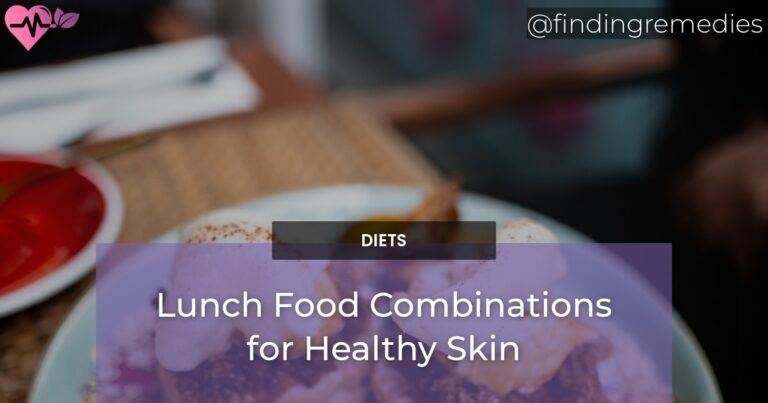When it comes to achieving healthy skin, what you eat plays a crucial role. Your diet can have a significant impact on the health and appearance of your skin. By incorporating specific food combinations into your lunch, you can nourish your skin from within and promote a glowing complexion. In this article, we will explore various lunch food combinations that are not only delicious but also beneficial for your skin health.
Table of Contents
Antioxidants and Their Impact on Skin Health
What are antioxidants?
Antioxidants are compounds that help protect your skin from damage caused by free radicals. Free radicals are unstable molecules that can accelerate the aging process and contribute to skin problems like wrinkles and dullness.
How do antioxidants benefit the skin?
Antioxidants work by neutralizing free radicals, reducing inflammation, and promoting collagen production, which helps maintain the elasticity and firmness of the skin. Including foods rich in antioxidants in your lunch can support your skin’s health and vitality.
Omega-3 Fatty Acids and Their Role in Skin Health
ALSO READ
The importance of omega-3s for skin health
Omega-3 fatty acids are essential fats that play a crucial role in maintaining healthy skin. They help keep the skin moisturized, reduce inflammation, and protect against sun damage.
Best sources of omega-3 fatty acids
Incorporate omega-3-rich foods like salmon, walnuts, and chia seeds into your lunch to reap the skin benefits. These foods provide a good dose of omega-3 fatty acids and help nourish your skin from the inside out.
Vitamin C and Its Effects on Skin
ALSO READ
The role of vitamin C in maintaining healthy skin
Vitamin C is an essential nutrient for skin health. It helps in collagen production, protects against UV damage, and brightens the skin.
Foods rich in vitamin C for skin health
Add foods like citrus fruits, strawberries, and bell peppers to your lunch to increase your vitamin C intake. These foods are not only delicious but also provide a boost of antioxidants and essential nutrients for your skin.
Vitamin E and Its Contribution to Skin Health
How vitamin E supports skin health
Vitamin E is a powerful antioxidant that protects the skin from oxidative stress, reduces inflammation, and promotes skin healing.
Food sources of vitamin E for healthy skin
Include foods such as avocado, almonds, and spinach in your lunch to incorporate vitamin E into your diet. These foods are not only rich in vitamin E but also provide other beneficial nutrients for your skin.
Vitamin A and Its Impact on Skin
The role of vitamin A in promoting healthy skin
Vitamin A is essential for maintaining skin health as it promotes cell turnover, prevents clogged pores, and supports the overall health and appearance of the skin.
Foods high in vitamin A for skin health
Carrots, sweet potatoes, and leafy greens are excellent sources of vitamin A. Including these foods in your lunch can help nourish your skin and give it a natural glow.
The Importance of Zinc for Skin Health
How zinc supports skin health
Zinc is a mineral that plays a vital role in skin health. It helps regulate oil production, aids in wound healing, and reduces inflammation.
Zinc-rich foods for promoting healthy skin
Incorporate foods like oysters, pumpkin seeds, and chickpeas into your lunch to increase your zinc intake. These foods not only provide zinc but also offer other valuable nutrients for your skin’s health.
Protein and Its Influence on Skin Health
The role of protein in maintaining healthy skin
Protein is essential for the formation of collagen and elastin, which are vital for the structure and elasticity of the skin. It also helps repair damaged skin cells and promotes a healthy complexion.
Protein-rich foods for improved skin health
Incorporate protein sources like lean chicken, tofu, and Greek yogurt into your lunch. These foods provide an excellent protein boost and support your skin’s overall health.
Incorporating Vegetables for Healthy Skin
The benefits of vegetables for skin health
Vegetables are rich in essential vitamins, minerals, and antioxidants that promote healthy skin. They help combat oxidative stress, keep the skin hydrated, and provide essential nutrients for a vibrant complexion.
Nutrient-dense vegetables for promoting healthy skin
Add nutrient-dense vegetables like spinach, kale, and broccoli to your lunch. These vegetables are packed with antioxidants and other skin-loving nutrients that can enhance your skin’s health.
Healthy Fats and Their Impact on Skin
The role of healthy fats in maintaining skin health
Healthy fats, such as those found in avocados and olive oil, are essential for skin health. They help keep the skin moisturized, improve elasticity, and protect against inflammation.
Sources of healthy fats for healthy skin
Incorporate foods like avocados, olive oil, and nuts into your lunch to boost your intake of healthy fats. These foods not only nourish your skin but also provide other health benefits.
Hydration and Its Effect on Skin Health
The importance of hydration for skin health
Proper hydration is essential for maintaining healthy skin. It helps flush out toxins, keeps the skin moisturized, and promotes a youthful appearance.
Hydrating foods and beverages for maintaining healthy skin
Include hydrating foods like watermelon, cucumber, and green tea in your lunch. These foods provide hydration and offer additional skin benefits, such as antioxidant protection.
By incorporating these lunch food combinations into your daily diet, you can support your skin’s health and achieve a radiant complexion. Remember to maintain a well-rounded diet that includes a variety of nutrients to provide comprehensive nourishment for your skin.

